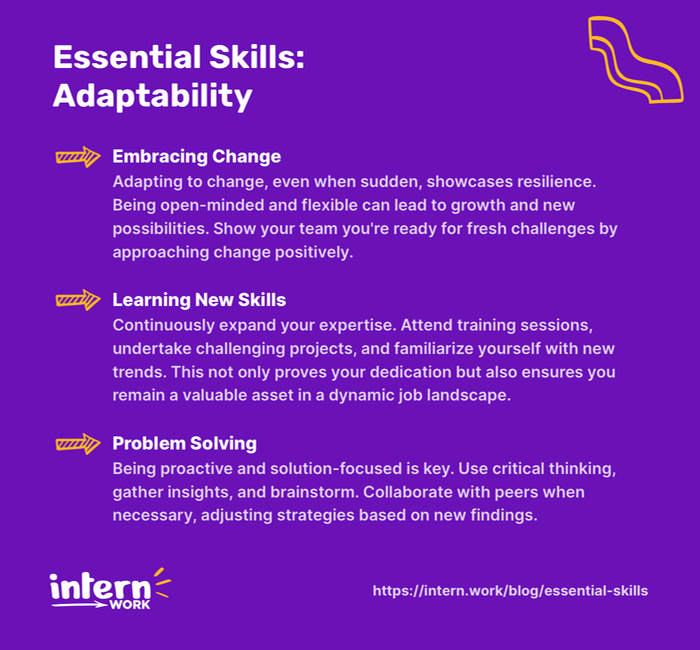
Embarking on an internship is an exciting and challenging opportunity that can pave the way for a successful career. While you may have been hired for your technical skills and academic training, there are many essential skills that every intern should master in order to thrive in the dynamic and competitive world of work.
Communication Skills
Effective communication is not only essential in our personal lives, but it is also the cornerstone of any successful workplace. As an intern, it is vital to master three key communication skills to thrive in any professional environment.
The first skill is verbal communication. Verbal communication involves expressing yourself clearly and articulately when speaking with colleagues, clients, and customers. This skill can be improved by practicing projecting your voice, avoiding filler words like “um” and “like,” and maintaining eye contact to convey attentiveness. It is also important to listen carefully to what others are saying and respond thoughtfully. Choosing positive and inclusive language that fosters collaboration and encourages dialogue is also crucial in verbal communication.
The second skill is written communication. Crafting professional emails, reports, and memos that are clear, persuasive, and informative is essential in any workplace. In writing, strive for clarity and precision. Keep your sentences short and to the point, and organize your thoughts logically with headings and bullet points. Always proofread your work for spelling and grammar errors, and ask a colleague or mentor to review it before submitting it. This shows your attention to detail and professionalism, which will help you stand out from other interns.
The third skill is active listening. Active listening is the process of fully concentrating on, understanding, and remembering what is being said. To be an active listener, practice mindfulness and focus on what the speaker is saying. Be attentive and engaged, ask clarifying questions, and provide feedback to demonstrate your understanding. Avoid interrupting or changing the subject, and remain respectful during disagreements or differing opinions. Active listening is a critical skill that will help you build strong relationships with colleagues and clients.
Master three key communication skills as an intern: verbal communication, written communication, and active listening. Practice clear and articulate speech, develop strong writing skills, and engage in active listening to foster effective workplace communication.
Verbal Communication
Verbal communication is an essential skill that can help you build strong relationships with colleagues, clients, and customers. Being confident and assertive is key to mastering verbal communication. However, it is also important to listen carefully to what others are saying and respond thoughtfully. Choosing positive and inclusive language that fosters collaboration and encourages dialogue is also crucial in verbal communication.
Moreover, it is essential to understand the cultural and linguistic differences that may exist in a diverse workplace. Being aware of these differences can help you communicate more effectively with people from different backgrounds and avoid misunderstandings.
Written Communication
Written communication is a critical skill that can help you convey your ideas and thoughts clearly and effectively. In today’s digital age, emails, reports, and memos are some of the most common forms of written communication in the workplace. Therefore, it is essential to master this skill to succeed in any professional environment.
When writing, it is crucial to understand your audience and tailor your message accordingly. Keep your sentences short and to the point, and organize your thoughts logically with headings and bullet points. Proofreading your work for spelling and grammar errors is also essential to ensure that your message is clear and professional.
Active Listening
Active listening is a crucial skill that can help you build strong relationships with colleagues and clients. It involves fully concentrating on, understanding, and remembering what is being said. Being an active listener can help you avoid misunderstandings and build trust with others.
However, active listening is not just about hearing what someone is saying. It also involves being attentive and engaged, asking clarifying questions, and providing feedback to demonstrate your understanding. Avoid interrupting or changing the subject, and remain respectful during disagreements or differing opinions. Active listening is a critical skill that can help you succeed in any professional environment.

Time Management
One of the biggest challenges for interns is time management. With multiple tasks and deadlines to meet, mastering prioritization, organization, and delegation will help you succeed.
Time management is a crucial skill that can help you achieve your goals and succeed in both your personal and professional life. Effective time management allows you to work smarter, not harder, and can help you avoid burnout and stress. As an intern, you will likely have a lot on your plate, but by following these tips, you can stay on top of your workload and achieve great results.
Prioritization
When it comes to prioritization, it’s important to start by identifying which tasks are most urgent and important. This can help you avoid wasting time on tasks that aren’t as critical. One helpful tool for prioritization is the Eisenhower Matrix, which categorizes tasks based on their urgency and importance. By focusing on tasks that are both urgent and important, you can make sure that you’re using your time effectively and efficiently.
It’s also important to set manageable goals and deadlines for yourself. This can help prevent procrastination and feeling overwhelmed. By breaking down larger tasks into smaller, more manageable ones, you can make progress towards your goals without feeling like you’re taking on too much at once.
Organization
Staying organized is another key aspect of effective time management. This can involve keeping a calendar, to-do list, and digital or physical filing system. By keeping track of your tasks and deadlines in a centralized location, you can ensure that you don’t forget anything important. It can also help you track your progress and identify areas where you might need to adjust your approach.
Another helpful tip for staying organized is to minimize distractions. This can involve turning off notifications on your phone or computer, or finding a quiet place to work where you won’t be interrupted. By minimizing distractions, you can stay focused on your tasks and avoid wasting time on non-essential activities.
Delegation
Learning when and how to delegate tasks can be a valuable skill, both in your personal and professional life. When delegating tasks, it’s important to clearly communicate expectations and provide the necessary resources to ensure success. This can involve setting clear goals and deadlines, providing training or guidance, or giving team members access to the tools and resources they need to complete the task.
Delegation can also free up your time to focus on higher-priority tasks. By entrusting others with certain responsibilities, you can ensure that everything gets done on time, while also giving yourself the space to focus on the tasks that require your unique skills and expertise.
Overall, effective time management is a critical skill for interns and professionals alike. By mastering prioritization, organization, and delegation, you can stay on top of your workload, achieve your goals, and succeed in your career.

Master time management as an intern by prioritizing tasks, staying organized, and delegating effectively. Set manageable goals, use tools like the Eisenhower Matrix, and keep track of deadlines. Minimize distractions and delegate tasks to free up time for higher-priority responsibilities.
Adaptability
Change is a constant in today’s fast-paced workplaces. Being able to adapt and learn new skills quickly is crucial for any intern. As an intern, you will be expected to be flexible and adaptable to the ever-changing demands of the workplace. Here are some ways you can demonstrate your adaptability:
Embracing Change
Embracing change can be difficult, especially when it comes unexpectedly. However, it is important to approach change with a positive attitude and a willingness to learn. Be open-minded and flexible to new ideas and approaches, and be willing to step outside your comfort zone. Remember that change can often lead to growth and new opportunities. By embracing change, you show your colleagues and supervisors that you are a team player who is willing to take on new challenges.
Learning New Skills
Learning new skills is crucial to your success as an intern. Make a point of continuously expanding your knowledge and skillset. Seek out opportunities to attend training, workshops, or conferences. Take on new projects that challenge you and expose you to new technologies, methodologies, or industries. This demonstrates your eagerness to learn and grow, and shows your colleagues and supervisors that you are committed to your role.
Additionally, learning new skills can help you stay relevant in a constantly evolving job market. By keeping up with the latest trends and technologies, you can position yourself as a valuable asset to any organization.
Problem Solving
Problem-solving is an essential skill for any intern. When faced with problems and challenges, it is important to be proactive and solution-oriented. Think critically, gather information, and brainstorm creative solutions. Seek input and advice from colleagues or mentors as needed, and be willing to adjust your approach as new information becomes available.
Effective problem-solving requires both critical thinking and creativity. By demonstrating your problem-solving skills, you show your colleagues and supervisors that you are a resourceful and valuable member of the team.
Adaptability is a key trait that every intern should possess. By embracing change, continuously learning new skills, and being a proactive problem-solver, you can position yourself as a valuable asset to any organization. Remember to approach every challenge with a positive attitude and a willingness to learn, and you will be well on your way to success as an intern.

Adaptability is crucial for interns. Embrace change, learn new skills, and solve problems proactively. Show your value as a team player and resourceful member. Embrace challenges and continuous learning to excel as an intern.
Teamwork
Collaboration and teamwork are at the heart of successful workplaces. As an intern, being able to work effectively with others is essential. However, teamwork is not just about working together; it’s about building relationships and supporting each other to achieve common goals.
Here are some ways to enhance your teamwork skills:
Collaboration
Focus on building strong relationships with your colleagues by listening, communicating clearly, and respecting different perspectives. Take the time to get to know your team members beyond their job titles. Understanding their interests, hobbies, and personal goals can help you to build a connection with them. This connection can lead to a more productive and enjoyable work environment.
When working on a project, make an effort to understand each team member’s strengths and contributions. Look for opportunities to leverage those strengths to achieve common goals. By doing so, you will not only achieve better results but also create a sense of shared ownership and responsibility.
Conflict Resolution
Different people will have different opinions and approaches to problem-solving. Conflicts are bound to arise at some point, and it’s important to be able to resolve them in a constructive and respectful manner. When conflicts arise, take a step back and try to see the situation from the other person’s perspective. Always remain open to feedback and other perspectives, and work collaboratively to find common ground. Remember that conflicts can be an opportunity for growth and learning.
Supporting Others
Be supportive and helpful to your colleagues. Offer to lend a hand when someone needs assistance, share your expertise when appropriate, and cheer on your team members when they achieve success. Your positive attitude and willingness to contribute will be appreciated, and will help foster a positive and productive work environment. Remember that supporting others is not only about helping them; it’s also about building trust and respect.

Teamwork is crucial for interns. Build relationships, collaborate, and support your colleagues. Understand their strengths and leverage them for common goals. Resolve conflicts constructively, seeking common ground. Be supportive and helpful to foster a positive work environment.
Key Takeaways
- Communication skills are essential for interns to thrive in a professional environment. Verbal communication involves expressing oneself clearly, listening attentively, and using positive and inclusive language. Written communication requires crafting clear and professional emails, reports, and memos. Active listening involves fully concentrating on and understanding what is being said.
- Time management is crucial for interns to handle multiple tasks and deadlines. Prioritization helps identify urgent and important tasks, setting manageable goals and deadlines. Organization involves keeping track of tasks and deadlines, minimizing distractions, and creating a filing system. Delegation can help distribute responsibilities and free up time for higher-priority tasks.
- Adaptability is important for interns to navigate change and learn new skills. Embracing change with a positive attitude and being willing to step outside of the comfort zone is key. Continuous learning and problem-solving skills help interns stay relevant and contribute to the team.
- Teamwork skills are essential for collaborating effectively with colleagues. Building relationships, understanding team members' strengths, and leveraging them for common goals enhance collaboration. Conflict resolution in a respectful manner and being supportive of others contribute to a positive work environment.
Wrapping up
By mastering these essential teamwork skills, you can make the most of your internship and set yourself up for a successful career. Remember to stay positive, flexible, and eager to learn, and you’ll be sure to impress your colleagues, mentors, and employers. Good luck!






